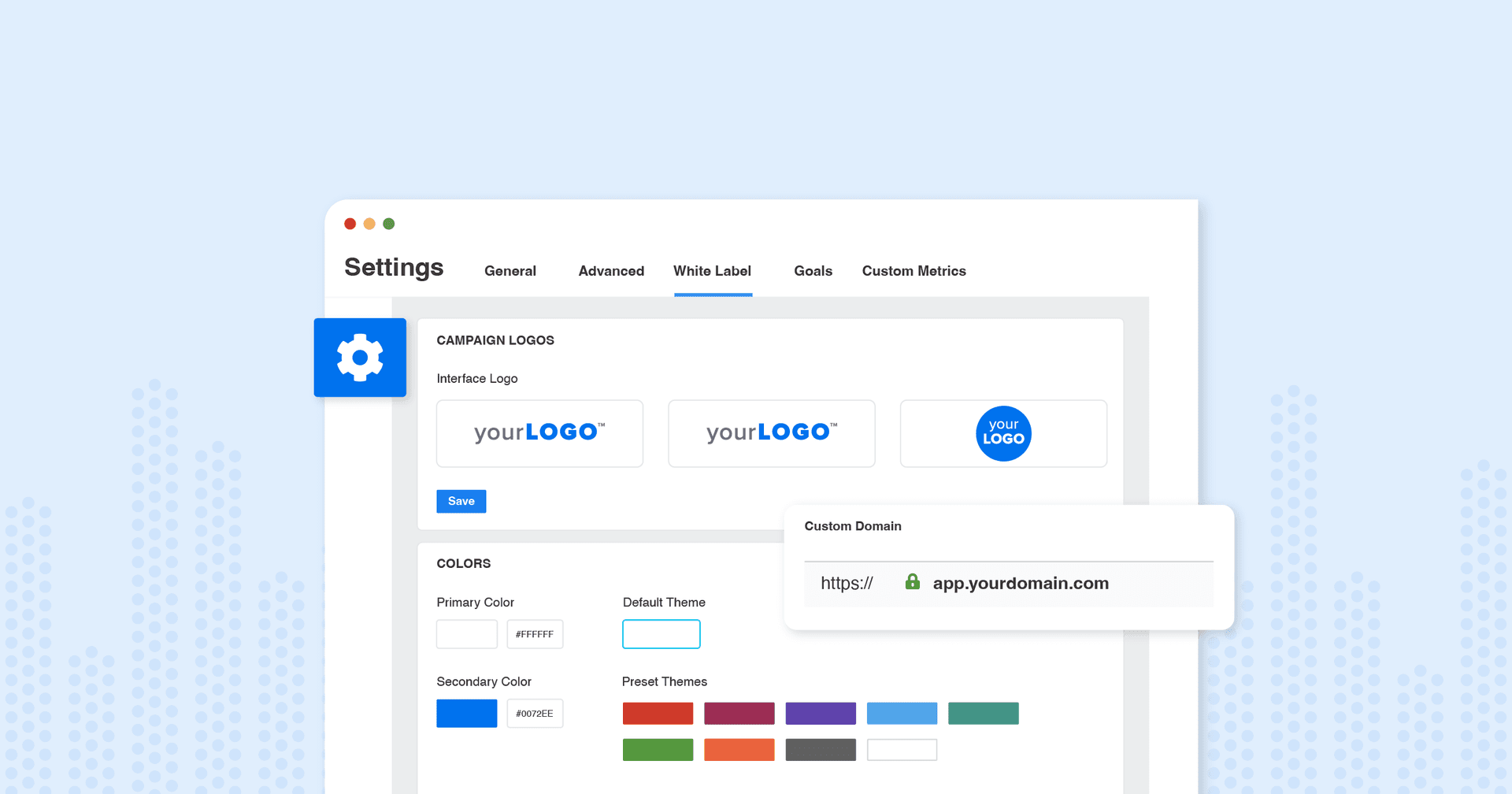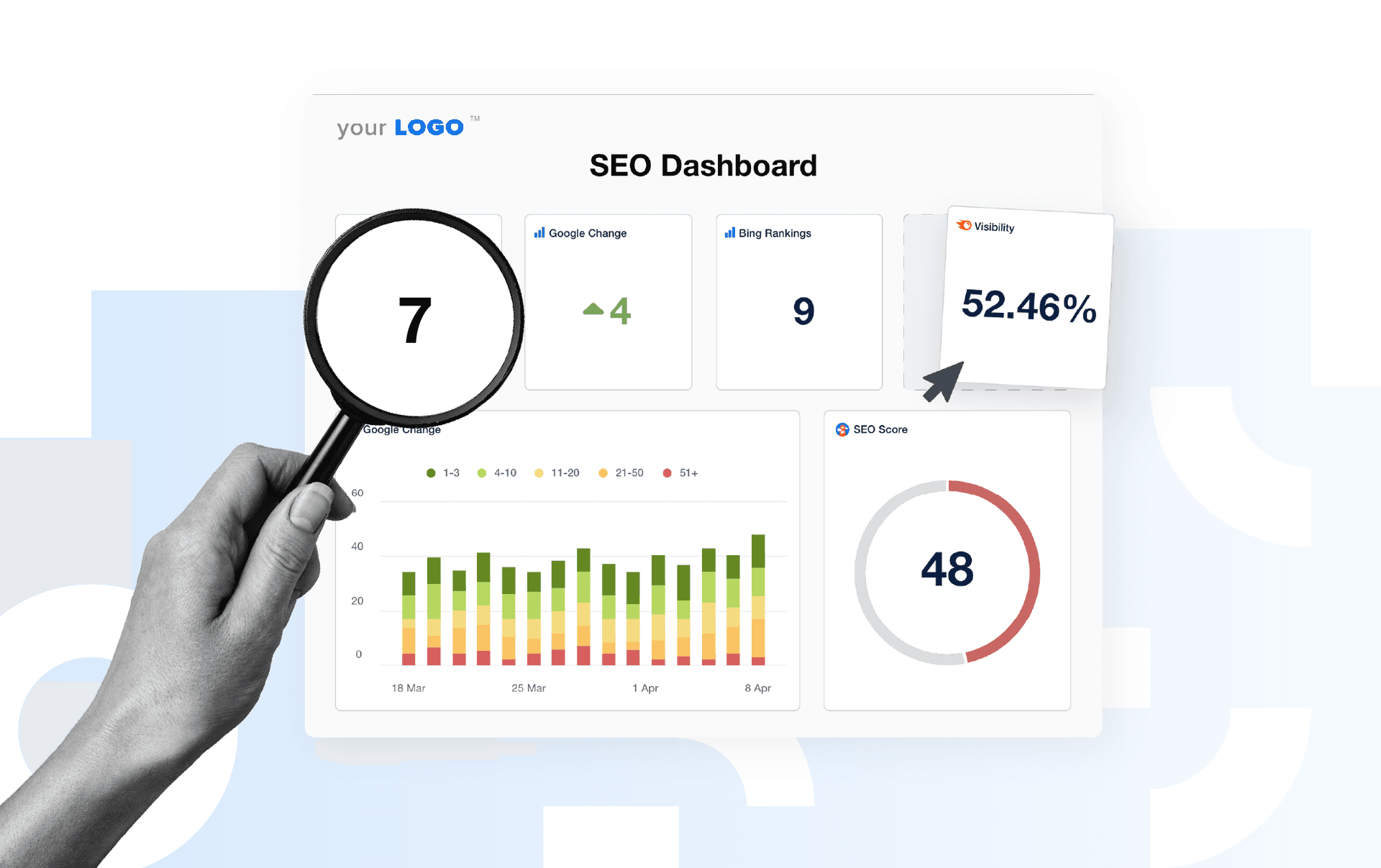Table of Contents
Table of Contents
- What Are SEO Resellers?
- Why Outsource SEO?
- The Benefits of Using an SEO Reseller
- What Are the Risks Associated With SEO Reseller Services?
- What Services Can SEO Resellers Help You With?
- How To Select the Right Partner
- How to Track Results From SEO Resellers
- What Are Some SEO Reseller Services?
- Summary and Key Takeaways
7,000+ agencies have ditched manual reports. You can too.
Free 14-Day TrialQUICK SUMMARY:
An SEO reseller program enables agencies to offer comprehensive SEO services by partnering with specialized providers. By reselling seo services, digital agencies expand service offerings without the need for in-house expertise, making it a cost-effective solution for enhancing clients' online visibility and search engine rankings. This guide explores the benefits of SEO reseller services and how to select a reputable provider to ensure success when offering white label SEO services.
Picture this scenario: an existing client asks for SEO services. You agree because you don't want to lose the client (plus the extra cash is nice).
Of course, you don't have enough SEO expertise, but you figure it can't really be that hard.
Fast forward a few months, and you struggle to get backlinks and organic traffic. Your client is frustrated, and your team is unhappy doing something they don't specialize in.
This is the tale of far too many agencies today–they either offer SEO services without actually knowing how it works, or they waste time learning SEO instead of focusing on their core competency. Thankfully, there is a workaround to this problem: SEO resellers.
SEO resellers help you outsource the entire optimization process to trusted experts. This gives you more time to get new clients and deliver your best work.
In this short guide, I'll show you how SEO resellers work, why you should use them, and how to find the right reseller.
Read on to learn about:
Let's get into it.
What Are SEO Resellers?
An SEO reseller is simply an agency specializing in SEO that white labels its services to other agencies (typically design, development, and marketing agencies).
Think of it as a team of SEO experts with highly developed processes for delivering better search results across different verticals.
How Does It Work?
SEO resellers typically have extensive relationships with publishers, editors, and writers to get high-quality backlinks at scale. More often than not, they also have a team of copywriters to help craft content.
It's not unusual for top resellers to offer customers a simple dashboard for ordering links/content and tracking results. Some resellers also white label their SEO reports and dashboards so it's easy to show your clients exactly how their campaign is performing.
In short:
SEO resellers help you offer clients SEO services without actually hiring any in-house SEO experts
The reseller takes care of all the search engine optimization, the client gets all of the benefits of a well-executed SEO program, and you pocket the profits
It's not always this simple, though. SEO can be fickle so read on to learn the drawbacks of reselling.
Why Outsource SEO?
There are many benefits to using SEO resellers, but fundamentally, there are three reasons you should use them:
1. SEO Is a Critical Service
As an agency owner, you already know that SEO is vital for marketing success, even in our social media-obsessed world. Consider that a little over half (53%) of all worldwide website traffic is attributed to organic searches. That means websites must be SEO-friendly, otherwise there's a reduced chance of visibility and overall traction.
And with SEO's ROI being up to 12X as high as marketing spend, it's certainly worth the hassle.
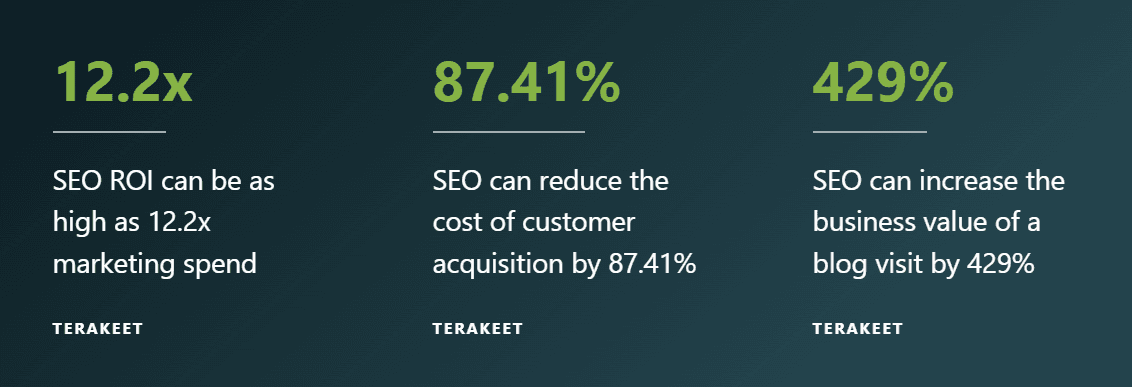
The data is clear: SEO is critical for marketing success and businesses are investing more and more in it. The demand for SEO services is poised to increase in the coming years as well.
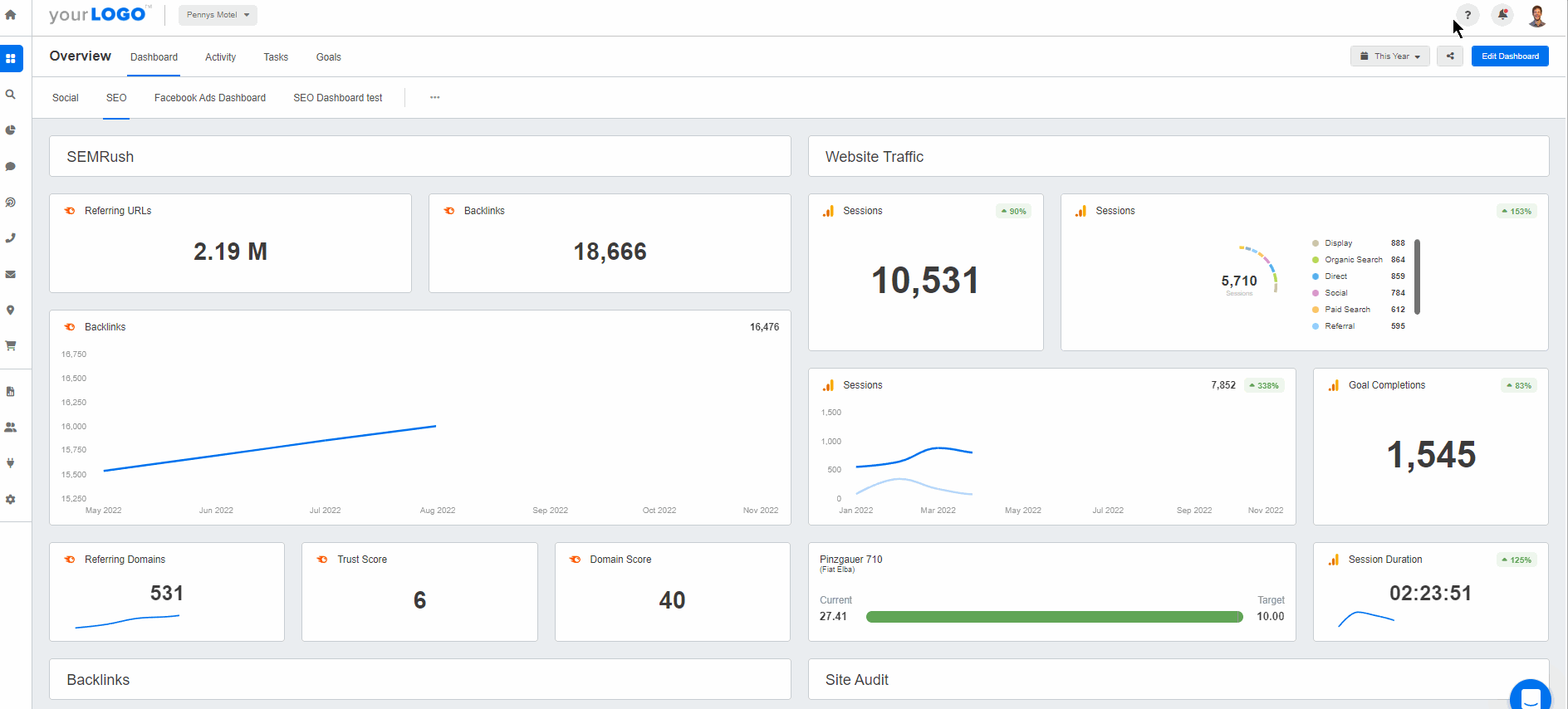
Maximize your agency's chances of SEO success by tracking real-time data insights. Use an SEO dashboard on AgencyAnalytics today–it's free for 14 days.
2. SEO Is Costly
Let's look at the dollars and cents to see the bigger picture. According to a study by Credo, the average SEO consultant charges $139.29 per hour.
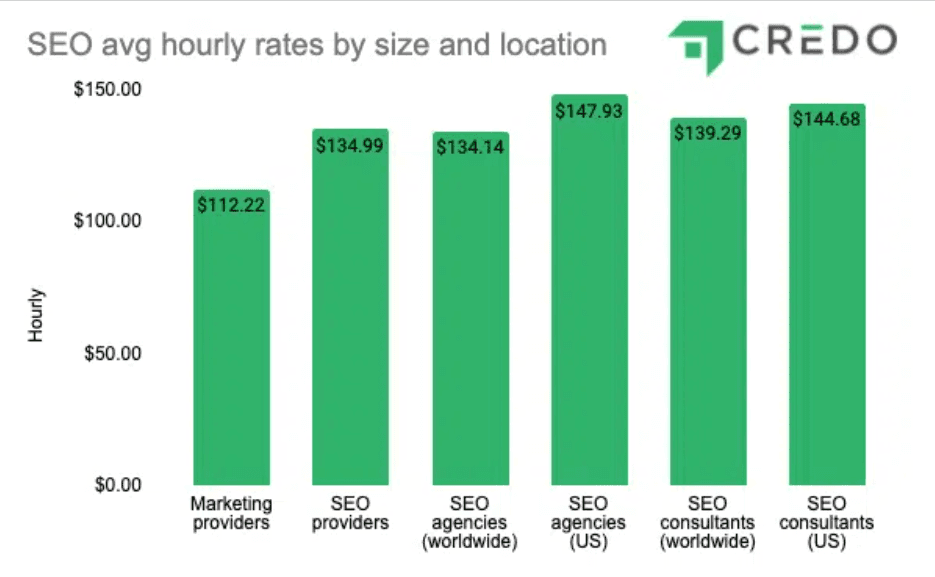
While it's true that you can hire SEO consultants off UpWork for under $25/hour, your results will most likely suffer. If you're going to outsource SEO, you will have to pay over $100/hour to get reasonable results.
What About Hiring In-house SEO Professionals?
The economics won't necessarily work in your favor here either. SEO consistently ranks among the most well-paying digital marketing specialties. According to Glassdoor, hiring a competent entry-level SEO will set you back by about $53,445/year.
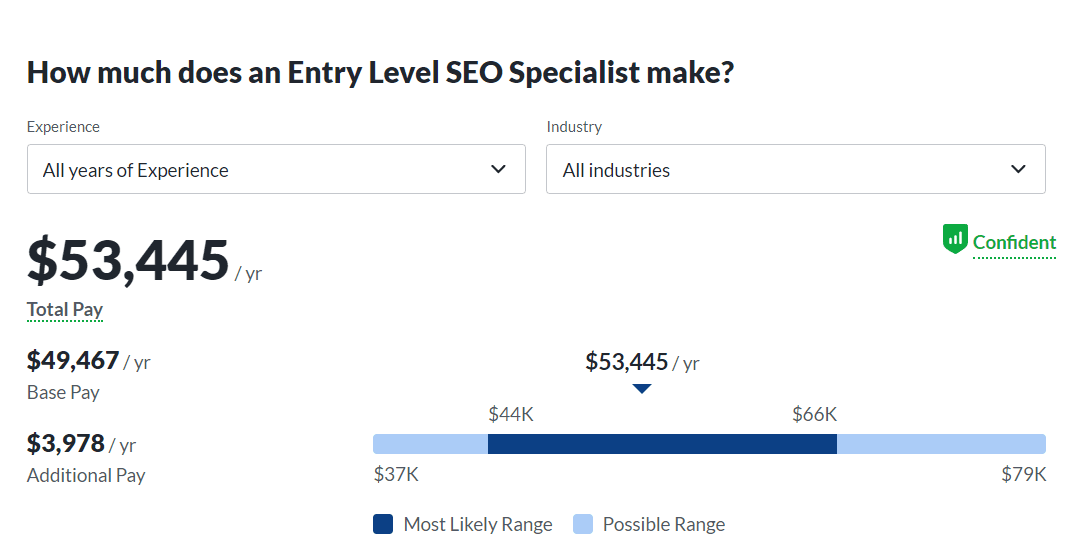
That's if you can even find competent SEOs to hire. There is a massive talent shortage in the SEO space. In fact, Marketing Week ranked it as one of the top three most in-demand marketing specialties in 2022.
For most agencies, bringing in in-house SEOs or hiring freelancers and then training them or getting them SEO certified isn't viable. There is a shortage of good SEO talent to spearhead an SEO division.
3. SEO Is Becoming More and More Complicated
The complexity graph of SEO follows the complexity graph of Google's algorithm. Back when Google still relied on anchor text and backlinks to determine rankings, you could do "SEO" by stuffing your page with keywords and buying some backlinks.
Today, Google's algorithm is one of the most complex pieces of code on the planet. Thanks to the close integration of dozens of services into Google (Android, Gmail, Drive, Docs, Google Plus, etc.) this is only going to become more complicated in the future.
All this means that an SEO professional's job is harder than ever.
They'll have to:
Keep track of Google's changes (e.g., the recent Google G4 update)
Find link-building opportunities
Develop high-quality inbound marketing content consistently
Keeping the reader's interest in mind is important for any type of writing, but especially for SEO content. When you're writing for the end user, you need to make sure that your content is engaging and interesting enough to keep people reading.
–Ruben Roel, President of Investigator Marketing
That's a lot of hats to wear!
To sum it up: SEO is complicated and costly. Yet it is heavily in demand and wildly lucrative. Unless you have personal experience with SEO and plan to make it your key competency, it can be tough to offer at scale.
SEO resellers make it possible for you to offer SEO services without making expensive hires to throwing away money on freelancers. This means more profits for you and happier clients.
The Benefits of Using an SEO Reseller
You now know the fundamental reasons to use SEO resellers – more money, fewer overheads – but there are plenty of benefits that go beyond this.
Let's look at a few of these below.
1. You Can Focus On Your Core-competency
If you're a design or development agency, you should focus on what you're good at.
SEO is complex. You shouldn't necessarily be wasting your time figuring out how to get backlinks. Instead, you should focus on the two things agencies need to do to be successful: a) get more clients, and b) deliver stunning results to said clients.
By taking care of all SEO-related work, resellers help you focus on your core expertise while giving clients what they want.
2. You Get Scalable Results
There is a big difference between "results" and "scalable results".
Sure, you might hire a freelancer who gets you 10 quality links for a client. But when the same client wants 500 links, your freelancer might be completely out of depth.
SEO is highly process driven. SEO resellers have established processes to find link-building opportunities, creating content, and leveraging editorial relationships. Because of these processes, they can offer scalable results as and when you need them.
This scalability means that SEO resellers can contract and expand their offerings as required. Whether you want 10 links or 1,000, your SEO reseller should be able to accommodate you.
3. You Can Work With Niche Experts
What do you do when a client asks for SEO services in a niche you have no experience in (say E-commerce or local search)?
This is where an SEO reseller can help. Since resellers work with lots of customers, they usually have expertise across different niches. This means you can serve E-commerce clients as well as local search clients = more profits for you.
4. You Don’t Have To Invest in New Relationships
As an agency owner, you likely have some relationships with editors, webmasters and content creators in your target niche (say, lawyers).
Now suppose you get a client from a new vertical. To offer this client SEO services, you'll have to build new relationships with editors and content creators from scratch.
Repeat this across multiple verticals and you'll see why most agencies stick to a single niche, locking up their growth potential.
SEO resellers, on the other hand, have relationships across niches. You can leverage these relationships to get better rankings for clients, regardless of their vertical.
5. You Get “On-demand” Services
Most quality SEO freelancers will demand a retainer. Hiring full-time SEOs doesn't make any sense until you have enough billable SEO hours.
SEO resellers, on the other hand, operate on an "on-demand" model. There are usually no subscription plans or contracts; you pay for what you need, when you need it.
The result?
Lower overhead costs and higher profits.
What Are the Risks Associated With SEO Reseller Services?
Of course, there are risks associated with SEO resellers. Since you don't have complete control over the optimization process, there is a chance you might get poorer results than what your clients are used to. An A-grade agency can't survive with C-grade SEO support services.
There are a few things you should look out for when using SEO reseller services:
1. They Might Resort to Spam or Black Hat Links
Despite widespread changes to Google's algorithm, SEO is still largely a link-building game. SEO resellers, under pressure to deliver results, sometimes resort to spamming blackhat links.
You'll have to keep your ear close to the ground and vet your reseller thoroughly before offloading your SEO work. Some resellers will deliver what they promise, but the danger of a poor link slipping past always remains. It's up to you to find out who to go with.
If that happens, know your way around Google's "Disavow Tool" and flag any link that doesn't meet your quality criteria.
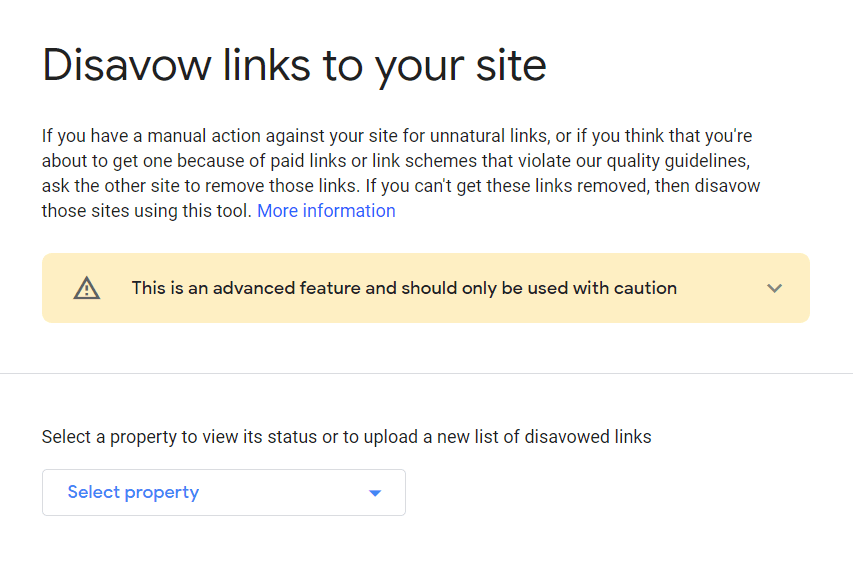
2. Your Clients Might See You as a Middle-man
Most clients won't care if you tell them that you will be partnering with another agency to deliver SEO work as long as they have a single point of contact.
Some, however, will wonder why they are even paying you in the first place (and not going straight to the reseller himself).
In such situations, be prepared to make a pitch about your own value additions. Clients should realize that you bring more than a few backlinks to the table.
3. You Might Get Links From Poor Sites or Poor Content
Blackhat links are a strict no-go, but what about links from sites that are just a little shy of web spam?
Google might not care if the linking page doesn't have 100% impeccable grammar, but your clients might.
There is also the danger of future Google penalties. A new algorithm update might flag your currently innocuous-looking link as "spam" (like what happened in Google Panda v1.0).
You'll have to vet your resellers and constantly monitor for poor-quality content. Your reseller should agree to a fixed standard in terms of content and site quality.
One suggestion to vet a reseller is to signup for your own backlink checker tool. Ask for a list of some of their current clients, and check the recent backlinks those clients received. If there are a number of poor-quality links, ask the reseller about them.
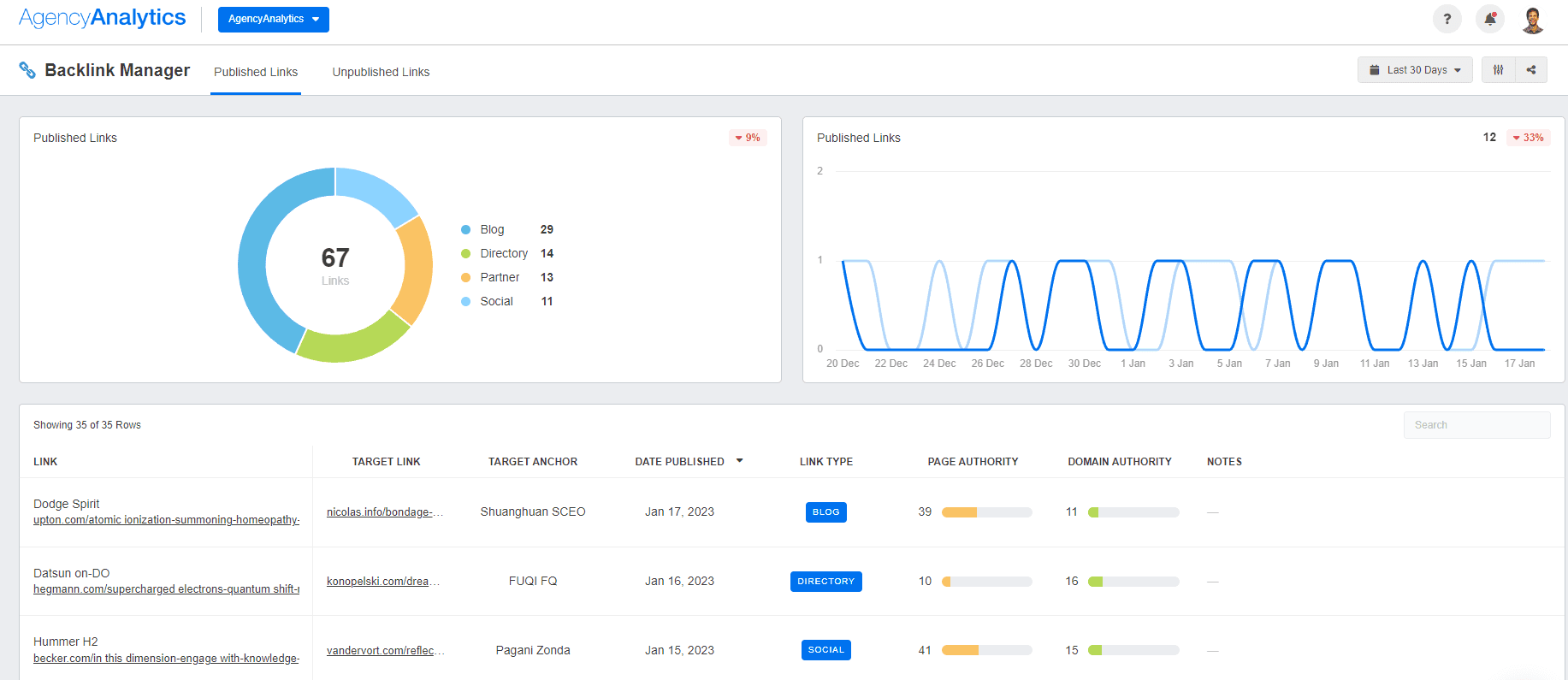
Use the AgencyAnalytics Backlink Manager to quickly identify any new, lost, or broken links. See what it's all about by signing up for a free 14-day trial.
What Services Can SEO Resellers Help You With?
There is a mistaken belief that SEO resellers only offer link-building services.
In truth, resellers usually operate like conventional SEO agencies. You can tap them for a whole range of SEO services, including but not limited to:
On-page Audit
The on-page SEO audit is usually the first step in a new campaign. SEO resellers usually have processes to conduct SEO health checks and can help you identify opportunities for quick wins.
Link Building
This is the bread and butter of SEO resellers. Resellers might use a number of tactics to build these backlinks, ranging from broken link outreach to guest posts.
Local SEO
SEO resellers often help with the dull, manual aspect of local SEO such as building citations and optimizing a Google Business Profile (GBP).
In a nutshell, GBP helps clients get free leads! It helps customers find them, contact them, feature their work, gather positive reviews from past clients, get ranked in maps for relevant keywords, get driving directions to them, take up valuable real estate when people are searching their business name. It's everything.
–Lane Rizzardini, Co-Owner of Marion Relationship Marketing
Content Creation
Some companies also have in-house copywriting talent or vetted freelancers to help you create content at scale. This usually won't be as good as content from a content marketing agency, but it will work well enough for SEO purposes.
Keyword Research
Instead of wrangling sense out of SEMRush data, let SEO resellers find lucrative keywords. Cross-reference these with your client's own expectations to create a winning keyword strategy.
How To Select the Right Partner
An SEO reseller will essentially act as the third arm of your agency. This is a relationship that goes beyond outsourcing; you'll be partnering with the reseller to handle a critical part of your client's business. Poor SEO doesn't just affect rankings; it can get a site delisted from Google.
When picking an SEO reseller, look out for these things:
1. Look For Reviews or References From Real People
While many consumers rely on online reviews before making decisions, in the case of SEO resellers, one-on-one feedback is preferable.
The reason is simple enough: reviews for SEO companies could be fake or misleading. Instead of resorting to online reviews, try to find real businesses that used the service (e.g., on Twitter or any other social media platform).
When you do find someone, reach out to them over DM for their actual results from the service.
This insight will be far more accurate than reviews from bloggers (who are usually affiliates).
2. Years in Business
SEO is a high-churn industry. Tactics and strategies change with each new addition to the search engine algorithm.
A reseller that has stayed in business for 5+ years at least has some processes in place to run SEO campaigns. It's not necessarily an indicator of quality, but it shows longevity and consistency – rare qualities in the SEO world.
Consider this when you're evaluating SEO reseller plans.
3. Number of Clients and Expertise in Your Target Niche
The different flavors of SEO – local, E-commerce, B2B, etc. – can vary a lot in their implementation. You ideally want to work with resellers with prior experience in your niche.
Look for past or existing clients in the same industry as your most important clients.
4. Payment Structure and Cost
This is obviously a big one – how much do the services cost?
There is usually a "Goldilocks Zone" for SEO services that balance cost and quality. You want the cost to be low enough to make reselling profitable. You also don't want it to be so low that you'll have to double-check every link.
At the same time, consider the kind of payment structure the reseller offers. Ask questions like:
Is there a monthly subscription plan?
Do you have to sign a contract?
Can you order services separately? Does the reseller offer bundle deals?
5. Communication Quality
During the vetting process, how promptly were your questions answered? Was the support staff knowledgeable? Is there someone to take care of emergency situations?
Consider all these questions before picking a reseller.
6. Test Drive the Service
Before you pick a reseller, take its services out for a spin.
Buy some links to a non-money domain to see how the service performs.
This might be time-consuming since the links might not start coming in for weeks, but it is a crucial step. Don't pick a reseller until you've verified the quality of the links and linking pages.
How to Track Results From SEO Resellers
Once you've chosen an SEO reseller, how do you keep track of their work?
If your reseller offers you a custom dashboard, then great. But more often than not, you'll have to rely on traditional tools: good communication and tracking.
Here are three ways you can track results from SEO resellers:
1. Constant Communication
Most resellers will happily offer you a weekly report on your campaign. Beyond this report, you also need to stay in constant touch regarding your current and future plans. If you plan to ramp up link building in the next few months, your reseller needs to know this.
Similarly, your reseller should keep you abreast of what's happening in his company and the SEO world at large. If there is a new algorithm change that's affecting search results, your reseller should warn you beforehand.
2. Monitor Backlinks Yourself
You want to keep a constant eye on the quality and kind of backlinks your reseller is creating for you. Look out for poor quality links or links that don't meet your service level agreement (say, you were promised DA 40+ links but keep seeing 20+ links only).
Broken or missing internal links or lack of a plan for sharing are some pretty standard issues across all industries. Everything should always be tested, shared, and tracked for traffic, backlinks, social stats, and lead conversions. Set dates to review content after a specific amount of time and be ready to make adjustments as needed.
–Kristen Ewen, Director of SEO at Property Manager Websites
Try using a tool like the AgencyAnalytics Backlink Monitor to make this process smoother.
3. Track Rankings and Organic Traffic Yourself
Better rankings are what all SEO eventually boils down to. The most well-executed SEO campaign would be a waste if it doesn't lead to better rankings.
Use one of your favorite rank tracking tools to track the progress of your clients' sites, and then wrap that up in a stunning white-label keyword tracking report. You can also use this to keep a check on your reseller's activities. Do not rely solely on their SEO analytics.
Get accurate SEO keyword rankings and monitor daily updates. Try the Keyword Rank Tracker on AgencyAnalytics, free for 14 days.
What Are Some SEO Reseller Services?
These kinds of services are a dime a dozen. Google away and you'll find hundreds of white-label SEO reseller programs.
Please note: we do NOT endorse any of these agencies. Do your own research before using any of them for your clients to find the best reseller for you.
Some of the more established companies are:
TheHoth - offers a complete bouquet of SEO services, ranging from regular blog content to high-quality editorial links.
HigherVisibility - is one of the oldest programs around. Because of its agency background, it makes for a perfect (if expensive) ally.
RankPay - offers pay-for-performance SEO. In other words, if you don't rank, you don't pay. They've been in business since 2009.
Globital - a wholesale white-label SEO provider offering website auditing, keyword research, on-page SEO, link building, and more on a month-to-month basis.
Summary and Key Takeaways
SEO resellers can give agencies an extra source of profits. By offloading all SEO tasks, you get time to focus on your core competency while making more money for yourself and your clients.
Finding the right SEO reseller can be hard, so take time to vet every provider, read reviews from real people and test drive the service before picking a reseller.
Regardless of which SEO reseller you choose, invest in an automated reporting solution and using professional SEO report templates to track performance and ensure you’re getting the best results. From monitoring SEO KPIs to running a comprehensive website audit to providing regular keyword ranking reports, AgencyAnalytics will help you to identify any potential issues and monitor SEO performance with ease.
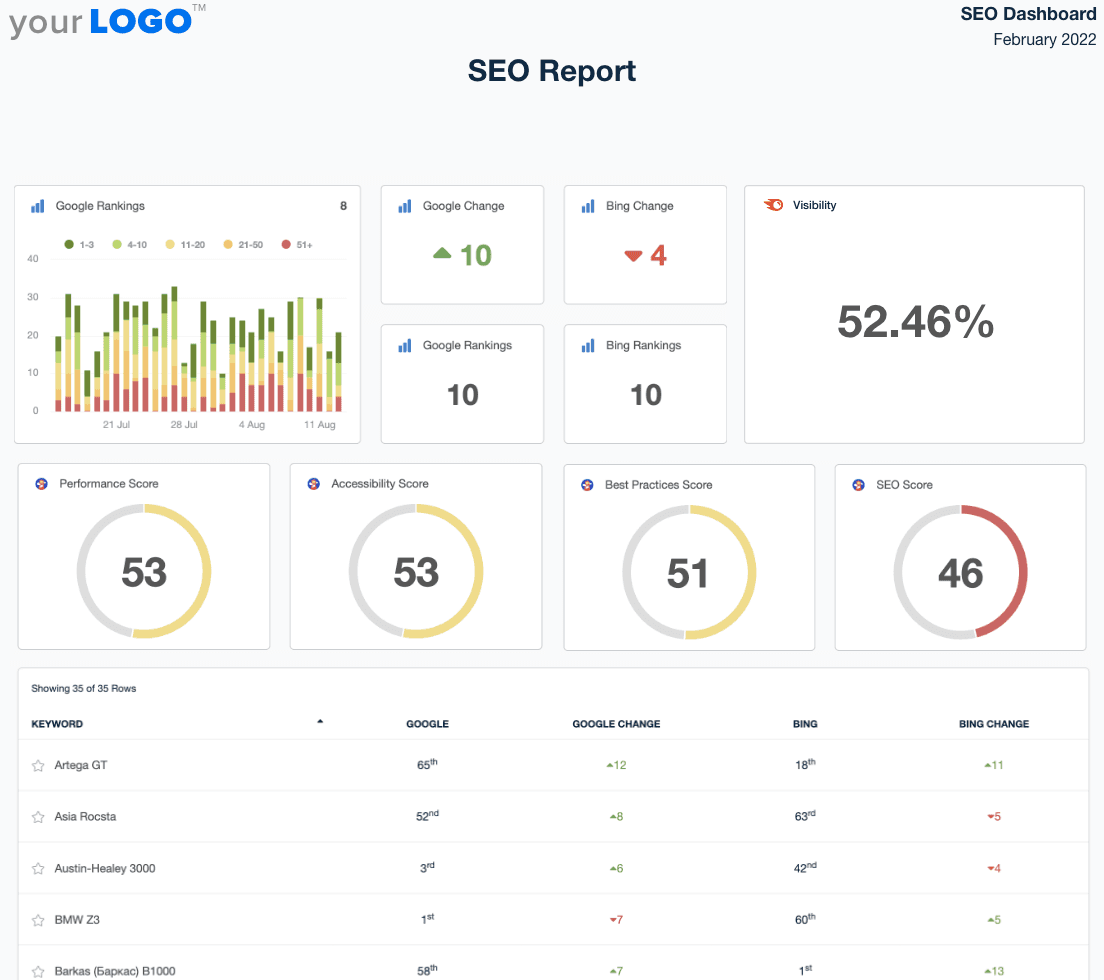
Use AgencyAnalytics to make informed SEO decisions and stay one step ahead. Try the automated reporting tool used by over 7,000 agencies–sign up for a free 14-day trial today.
FAQs About SEO Reseller Programs
Still not sure if an SEO reseller program is right for your agency? These FAQs will help clear things up.
An SEO reseller program lets agencies offer expert SEO services without doing the work in-house. Agencies partner with specialized providers who deliver search engine optimization under the agency’s brand. It's a white-label setup that helps agencies expand their services without hiring or training SEO staff.
SEO resellers handle strategy and execution behind the scenes. They build links, create content, conduct audits, and more while agencies stay client-facing. Many resellers offer white-labeled dashboards and reports so agencies can deliver seamless results under their own brand.
Agencies save time and overhead, scale results fast, and stay focused on their core strengths. White-label SEO reselling also gives agencies access to niche experts, on-demand services, and established processes without needing to build their own SEO team from scratch.
Start by reviewing client testimonials, years in business, and niche experience. Then, vet quality by testing small orders and checking link sources. Prioritize providers with clear communication, flexible payment terms, and proven results across verticals.
Most packages include link building, keyword research, content creation, on-page audits, and local SEO. Many resellers also offer tools to track performance, such as dashboards and white-labeled SEO reports through platforms like AgencyAnalytics.

Written by
Joe is the co-founder and CEO of AgencyAnalytics, a marketing reporting platform used by more than 7,000 agencies. With experience creating multiple businesses, he thrives on tackling the challenges of sustainable growth and innovation.
Read more posts by Joe KindnessSee how 7,000+ marketing agencies help clients win
Free 14-day trial. No credit card required.




